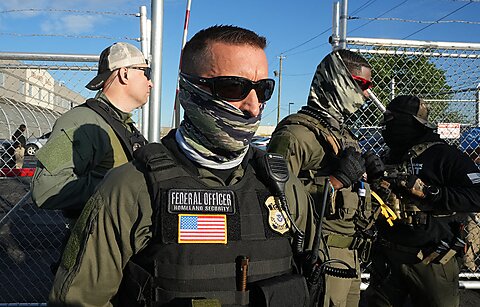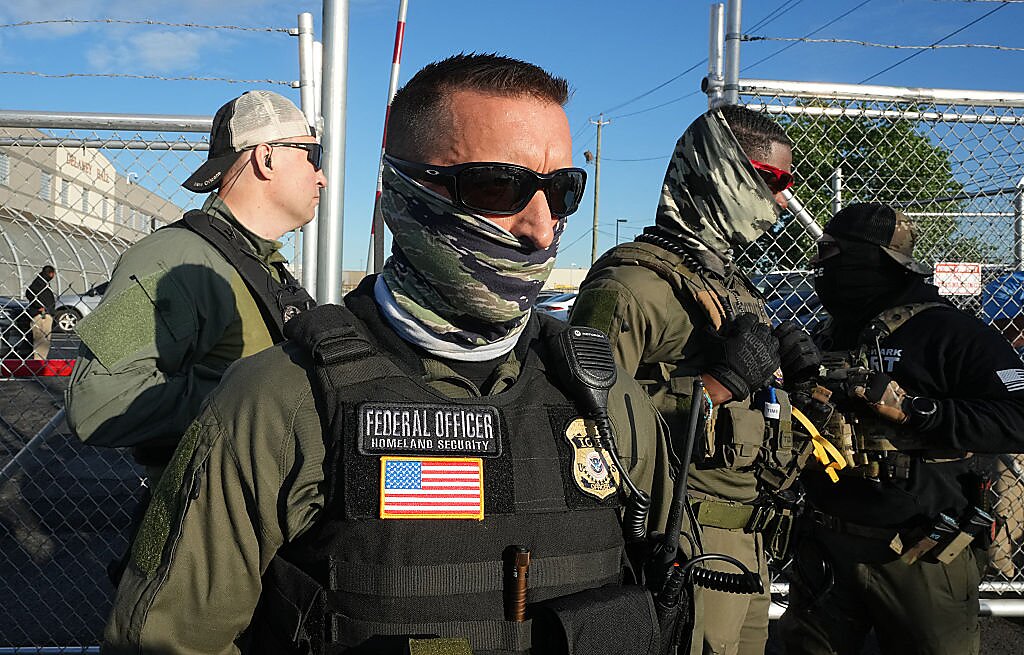Walter Olson
I had missed the story from two weeks ago about what happened after (apparent) agents of the US Immigration and Customs Enforcement (ICE), one wearing a balaclava to hide his face, seized two men at the Charlottesville, VA, courthouse. The sequel, as reported by the local paper, the Daily Progress, was that an *unnamed* (!) ICE spokesperson threatened to prosecute two persons at the scene who challenged the action and asked the agents to identify themselves or show a warrant. The headline read: “ICE promises bystanders who challenged Charlottesville raid will be prosecuted.”
Leave aside the question of when, if at all, it is proper to prosecute bystanders under these circumstances. Why is it considered acceptable for ICE enforcers to wear masks to hide their identity in the first place? They did so last week, a video shows, when they arrested Newark, NJ Mayor Ras Baraka as he protested at a detention facility. A casual search reveals that ICE agents have worn face coverings, ski masks, and the like in raids and stops reported from around the country (Westminster, MD; Douglas County, CO; Great Barrington, MA; Bellingham, WA). Federal agents wore masks when they abducted Turkish grad student Rümeysa Öztürk off a street near her Boston-area home. (She was freed by a judge last week.) The Trump Department of Homeland Security appears to have made it standard practice.
At what point will we as a nation find ourselves with a secret police?
People who mask themselves before street confrontations ordinarily do so to avoid legal and public accountability, especially when they are up to no good.
You don’t have to take my word on this. In its letter sent to Harvard University on April 11, the Trump administration itself insisted, as part of its demands to toughen student discipline, that “Harvard must implement a comprehensive mask ban with serious and immediate penalties for violation, not less than suspension.” Its rationale was straightforward enough: if student demonstrators can conceal their identity, they might break laws or rules with impunity.
So can ICE agents—or at least whoever is conducting these raids and stops in ICE’s name. Aside from the masking, agents in videos are often seen wearing outfits so random and ill-assorted that they have sparked speculation that they are persons borrowed from local or state law enforcement work or even private security. It’s hard to know when dodging identification is part of the plan.
Defenders of the practice say if the identities of arrest teams were known, they or their families might become targets for public shaming, harassment, or even violence. Similar concerns haven’t deterred judges, who in the past year have come under a wave of threats, often serious. Despite the real fear, jurists haven’t resorted—and in a free society, mustn’t resort—to concealing their role in administering the law.
Hypotheticals about whether police masking might have proper uses under very extreme circumstances—say, in arresting members of a major criminal gang known for retaliating against law enforcement—are less than relevant to the federal detentions in recent weeks, which have often targeted persons with no police record at all, let alone a record of violence. But masking—as with overkill in the quantity of agents, vehicles, and weaponry sent in to a scene—does convey a message of intimidation.
For the Trump administration, turning masked raids into standard practice fits into a wider effort to dodge accountability for potentially illegal and unconstitutional actions. In the contempt proceedings over its alien removals, for example, as I noted last week, the Department of Homeland Security has defied a judge’s insistence that it make clear which individual officials made key decisions, a necessary step if judges are to impose accountability correctly.
And the administration’s newest rumbling—that it might try to suspend the writ of habeas corpus itself—can be viewed in one light as an even wider bid to escape identification and responsibility for misconduct. It is through habeas and similar proceedings, after all, that judges ascertain that a particular raid detained the wrong person by mistake, or detained someone who is a citizen or in the country legally, or evaded required legal steps—mistakes that fuel public ire and demand for closer controls on the process. (In practice, presidential adviser Stephen Miller’s overtures about suspending habeas are themselves lawless, because the Constitution puts Congress in charge of such a suspension and requires, as colleague Ilya Somin has explained, that it both occur in time of invasion or rebellion, and separately that it be necessary for the public safety, neither of which condition is now met.)
Whether or not they follow through, the administration’s floating of the idea of suspending habeas shows clearly where some of its key figures would like to head. No habeas? No public revelations about who was wrongly taken and what was wrongly done to them. And ever more impunity for an administration that seems hell-bent on trampling constitutional liberties.
Adapted from a post at Walter Olson’s Substack.


